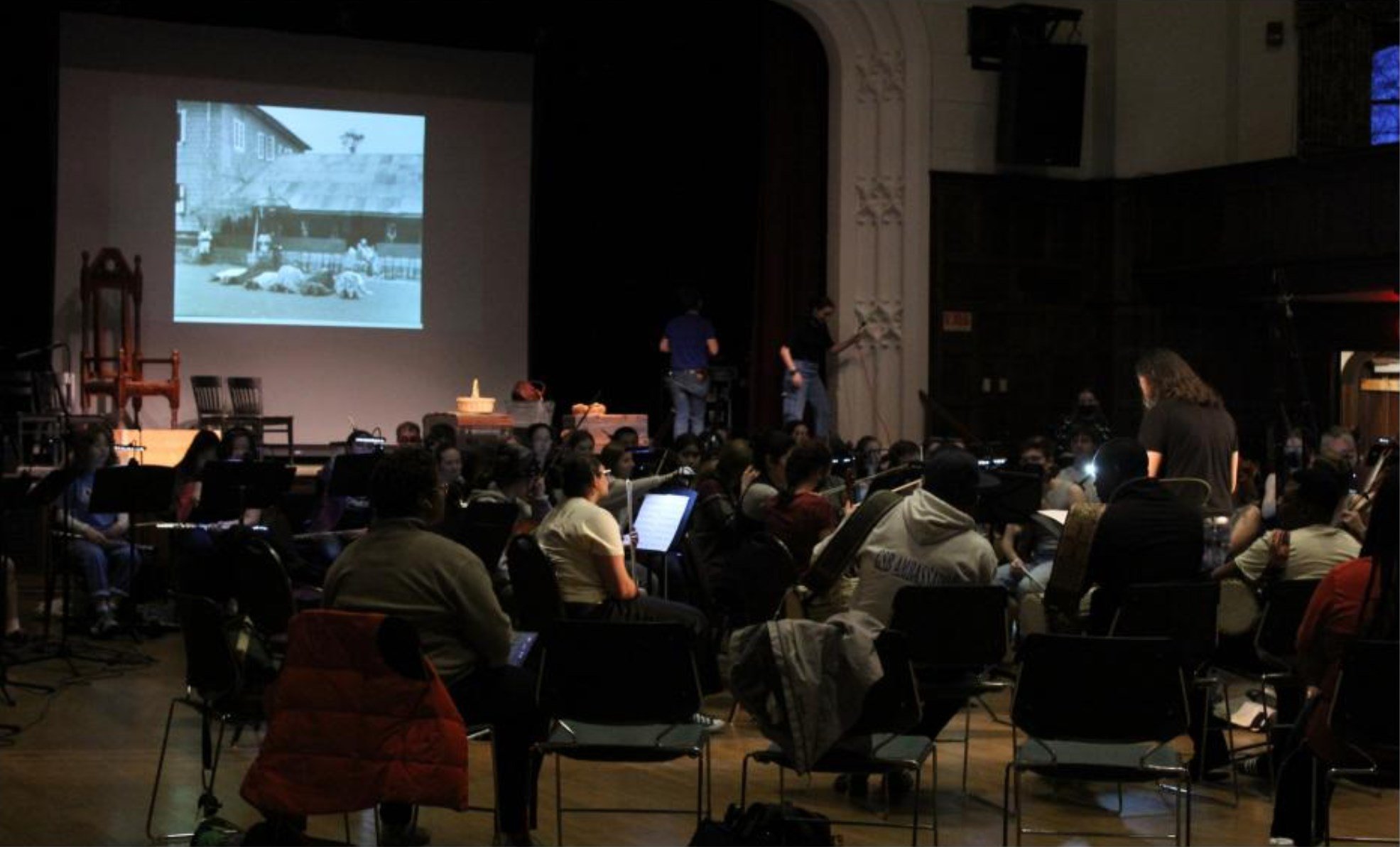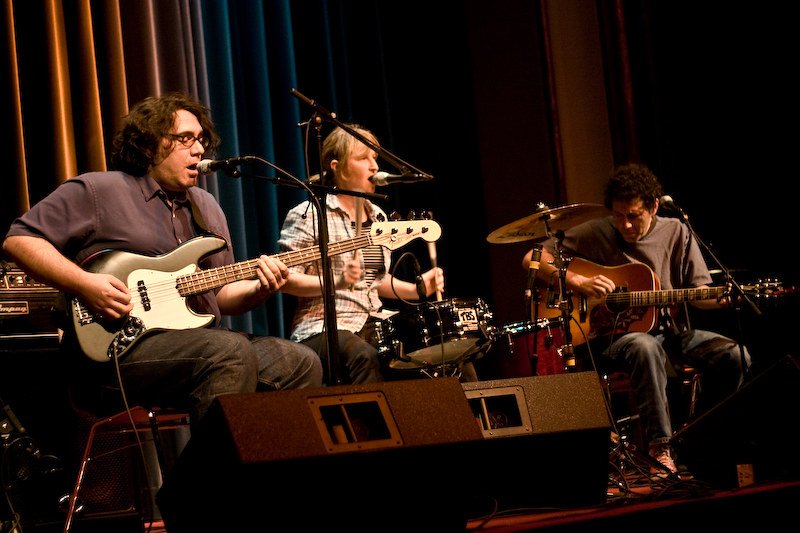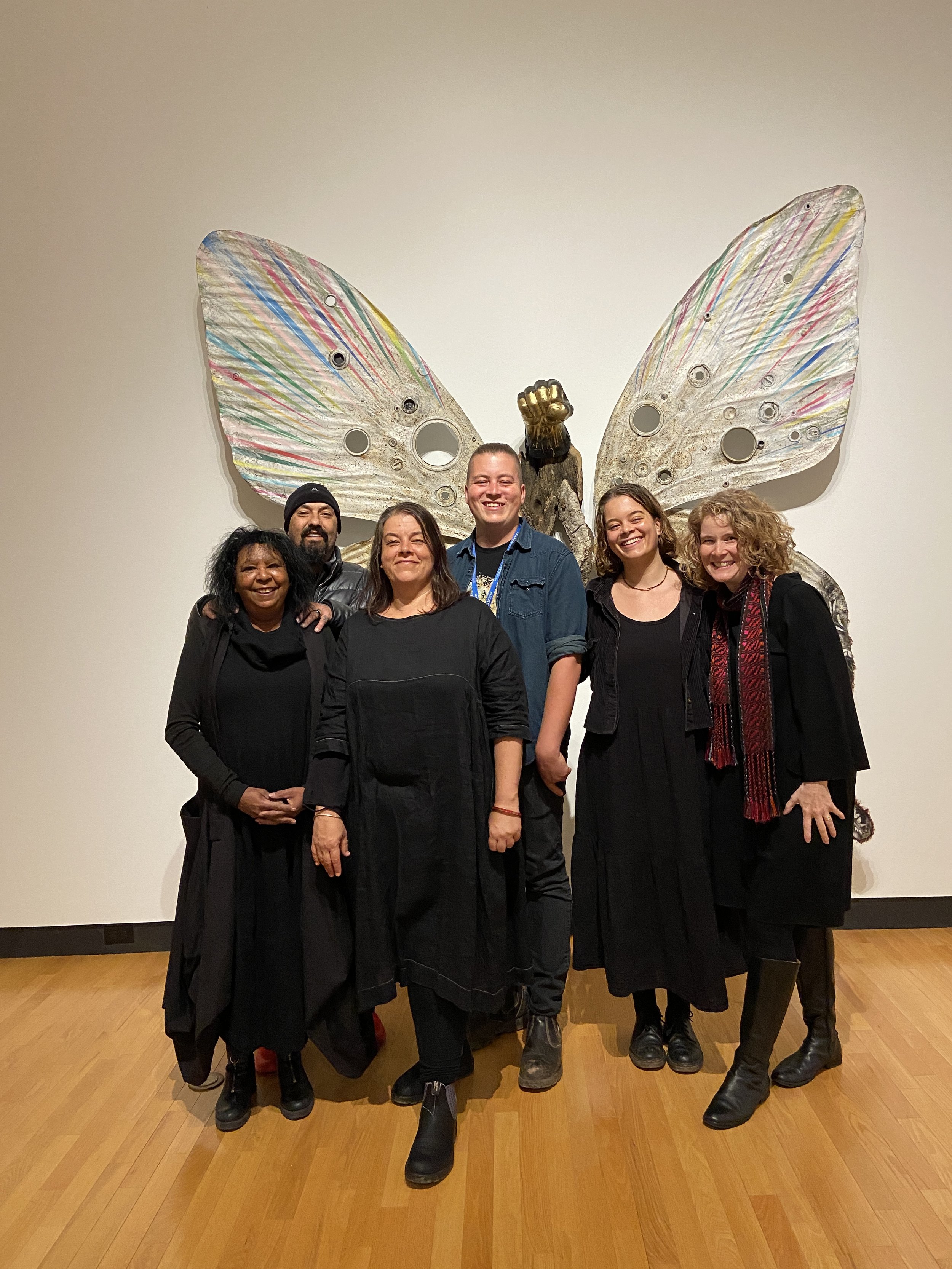Nobody ever wants to pay taxes. The sentiment is in the air — April 18 is Tax Day! — as well as the arts. “Funmilayo,” the fourth production in the African opera series at Mount Holyoke, explores just one moment in the rich life of Funmilayo Ransome-Kuti: when she fought British colonial rule in what is now present-day Nigeria through protests against a special tax imposed on women in the 1940s.
New Yo La Tengo album looks frankly at the state of the world
Yo La Tengo, a New Jersey-based band founded in the 1980s, released their 17th album, “This Stupid World,” in February. The album’s nine songs trace topics such as aging, death, and perseverance. Photo courtesy of Ricardo Romanoff via Flickr.
By Lucy Oster ’23
Arts & Entertainment Editor
I am always wondering if life is either good or bad — a reductive way of looking at the world, but I can’t help it. Lately, I’ve been reluctantly settling on the latter, as romantic heartbreak looms eternally and trains tip and spill poison. When I feel like this, I turn to people with years on me, who have seen so much bad and good that they’ve learned to take the two extremes with a grain of salt, knowing it can all change so quickly.
“This Stupid World,” released on Feb. 10, is the 17th album from New Jersey-based band Yo La Tengo. Clocking in at nine songs, a respectable number for an objectively late-career release, “This Stupid World” does not blow up the Yo La Tengo sound established on prior albums such as their previous 2018 album, “There’s A Riot Going On,” in any way, and that can be appreciated in a world that can be so destructive otherwise. After all, how can artists remain authentic and produce something unorthodox if they’ve spent decades consistently releasing albums? Specifically, how can an independent rock artist continue writing music about love and sadness, the most obtuse yet overdone topics? The answer to these questions has yet to be discovered, but it’s clear that Yo La Tengo has a clue, and their new album can help steer you through the messy nuances of life.
The album starts as expected for an indie rock band: with a lot of messy guitar and a steady drumbeat. Yo La Tengo formed in the 1980s, and this will likely affect their music style for as long as they produce it, with rougher-sounding musical attributes and soft vocals defining the band. These sounds are present on the new album, and especially in the two first songs on the album, “Sinatra Drive Breakdown” and “Fallout.” The songs on “This Stupid World” are generally lyrically lean with longer musical interludes. The lyrics that do emerge are poignant to many aspects of life. The album, after all, has a title that seeks to define the world, and the band has certainly been around the block.
“Fallout,” the first single and the album’s most-played song on Spotify, is about a desire to “fall out of time” because “every day it hurts to look.” The sentiment is not positive, but it’s delivered in an honest tone. As I listen to the song, I cannot always disagree with the desire to fall out of time briefly, and I feel relieved that I am not so alone in it.
Much of the album seems to cover aging and even death. “Until It Happens,” asks the listener to “Look away from the hands of time” and even “Prepare to die.” The last song on the album, “Miles Away,” wisely remarks: “The pain creeps in anyhow / You feel alone / Friends are all gone / Keep wiping the dust from your eyes.” The “keep” in the action of wiping the dust from your eyes is key to “This Stupid World.” Consistency and keeping on will change one’s perspective on life from bad to good and back again forever until it all ends.
Nuance is everything in this stupid world, and everything in “This Stupid World” as well. The songs are sonically harsh with soft lyrics, and the meaning behind the lyrics is full of nuance as well. “Sinatra Drive Breakdown” has the lyric “I see the moon rise as the sun descends.” Change is the only constant that we can rely on. Still, not all of the songs on the album are so bleak, as not all aspects of life are. “Tonight’s Episode” is bouncier than the other songs in Yo La Tengo’s repertoire, with fun lyrics about walking dogs, milking cows and the Japanese dish Shabu-shabu. Vocalist and guitarist Ira Kaplan even remarks, “I’ll show you a yo-yo trick.” Kaplan and one of the other members of the three-person band, Georgia Hubley, are married, and that domesticity shines through in “This Stupid World.” Married life also appears on the album in sadder ways, such as the song “Apology Letter,” where Kaplan sings, “If I were to smile at you / Would you smile at me?”
At the beginning of “Aselestine,” the second single, Hubley chuckles in the song’s prelude before sharing a gentle song. The lyrics are not sweet, proclaiming, “Where are you? / The drugs don’t do / What you said they do.” Yet, the tone is lifting and a release from the sonically harsher noises. Here, Yo La Tengo demonstrates that a compositionally soft song can encompass some of the bleakest lyrics, the opposite of their usual mode of louder songs and sweeter lyrics.
“This Stupid World” reveals that we cannot separate the bad and good from life. They are intricately tied up together, and they both make the other stronger with their contrast. I can, and even have to, appreciate both if I want to enjoy living even a little bit. After all, as the album’s titular song says, “This stupid world / It’s killing me / This stupid world / Is all we have.”
Students react negatively to Netflix’s password-sharing crackdown
Netflix began offering streaming content in 2007 and has since remained a top streaming service. Photo courtesy of rawpixel via rawpixel.com.
By Lucy Oster ’23
Arts & Entertainment Editor
Video streaming giant Netflix has finally followed through with its promise to crack down on password sharing. According to the company’s support website, “[p]eople who are not in your household will need to sign up for their own account to watch Netflix.”
This development will likely significantly impact how media hosted on Netflix is shared since many people do not pay for their own Netflix accounts. There have been memes proliferating on social media for years about people using their ex’s subscription — in March 2017, the official Netflix Twitter account posted, “Love is sharing a password.”
Now, Netflix will not allow people access to an account if they are not connected to the Wi-Fi associated with the account. This change will certainly affect college students who use their parent’s account, impacting Mount Holyoke students, where 95 percent of the student body lives on campus.
Many college students stream movies and television shows to decompress from schoolwork and other stress-inducing activities. Amelia Zamonski’23 described Netflix as “just easy access.” The platform was one of the earlier sites that began offering streaming content in 2007. What helped Netflix earn its definition of ‘easy access’ was the password-sharing aspect.
Carissa Barry Moilanen’23 uses their parent’s Netflix subscription and shares their password with two other friends. Zamonski uses her mother’s account, and her grandmother unwittingly shares her Netflix account with one of Zamonski’s friends. “One of my friends from home, at least up until recently, still used my grandma’s Netflix account, like my profile,” Zamonski said.
Password sharing kept Netflix competitive. In a world full of, according to Zamonski, “one thousand individual streaming services,” the fact that nearly everyone has access to Netflix and can reference shows and expect people to understand what they mean is rare: this cultural power can be demonstrated by “Stranger Things” boosting a Kate Bush song from 1985 to the top 40 charts decades later.
The variety of content Netflix offers can be both a pro and a con. Zamonski mentioned that what they liked about Netflix was the breadth of Spanish language content, which seemed lacking on other streaming services. Laura Thornburg’23 said, “I think the problem where you scroll forever looking for what to watch is worse than before because there’s not really an easy, obvious choice anymore. It’s just all crazy stuff.”
It’s still unknown just how Netflix changing its password-sharing rules could alter the lives of people, on the College’s campus and beyond. “Stranger Things” was the most-streamed show of 2022, but shows on HBOMax that release weekly, like “The Last of Us,” are what’s increasingly talked about online.
Barry Moilanen shared that they wouldn’t pay for Netflix themselves if the platform kicked them off their parent’s account. “I would just transition solely to Hulu, which has better content anyways,” Barry Moilanen shared.
It’s possible that as the features that Netflix is known for, like password sharing, come to an end, Netflix may fade alongside them.
‘PACHACUTI’ art exhibition explores climate change through collage/multi-media art
Mount Holyoke Studio Capstone Exhibitions started on April 11. One exhibition on display is “PACHACUTI: making/unmaking” by So Quimbita ’22, also known as So Hess. The art in the show is largely focused on themes of climate change and colonialism, and its intention is to cause the viewer to think about these subjects in new ways. “PACHACUTI” will be hosted in the Blanchard Gallery until April 20, and features pieces that So has been working on for the past few years.
Indigenous artists in residence present ‘Ancestral Memories’
By Lucy Oster ’23
Staff Writer
Photo courtesy of Ellen Alvord ‘89
At “Ancestral Memories: Artists in Conversation,” a team of Indigenous Australian artists stand in front of a sculpture by Hector Dionico Mendoza
The Mount Holyoke College Art Museum, in collaboration with the University of Melbourne and a team of Indigenous Australian artists, hosted an event on Thursday, April 7, called “Ancestral Memories: Artists in Conversation.”
The artists, Maree Clarke (Mutti Mutti/Wamba Wamba/Yorta Yorta/Boonwurrung), Nicholas Hovington (Palawa), Kerri Clarke (Boonwurrung/Wemba Wemba), Mitch Mahoney (Boonwurrung/Wemba Wemba/Barkindji) and Molly Mahoney (Boonwurrung/Wemba Wemba/Barkindji), are currently in residence at Mount Holyoke as a part of Assistant Professor of Anthropology Sabra Thorner’s “Special Topics in Anthropology: Decolonizing Museums” seminar. The class has been focusing on centering Indigenous knowledge practices and art making over a more colonial lens.
Associate Curator of Visual and Material Culture and Native American Graves Protection and Repatriation Act Coordinator Aaron Miller and Thorner opened the Ancestral Memories event. Thorner gave an updated version of the usual Mount Holyoke College land acknowledgment, urging audience members to understand the history of the Nonotuck land that the College is situated on.
“I encourage all of you to learn about and to amplify the contemporary work of the Indigenous nations whose land you’re on, and also endeavor to support Indigenous sovereignty in all the ways that you can,” she said.
Thorner also connected her land acknowledgment to the artists. “Your engagement with and your witnessing of the work of these artists is part of that process, so I extend my gratitude to you for coming here today,” she said.
“My own use of my own land acknowledgment is going rogue, right? I used my own because I feel like it’s more meaningful and more impactful and more accurate and more thoughtful than the one that is being presented to us to offer up as the official body of the College,” Thorner later shared.
After Thorner’s statement, Maree Clarke, one of the visiting artists, took over. Maree Clarke gave a presentation about her work as an artist reviving cultural practices in Southeastern Australia. She described herself as an “independent multidisciplinary artist and curator with more than 30 years working with First Nations people.” She spoke about Aboriginal art practices and how they are connected to country, culture and place, and shared stories about taking the teeth out of kangaroo roadkill to make necklaces.
“[Maree Clarke] described the PowerPoint she presented as her life’s work. … It was going through everything she had done artistically and it was really cool to see how it had changed over the years, but also how she had gotten more influence from her family,” Domenica Guaman ’22, an anthropology and Spanish major who attended the event, said. Guaman is also a student in Thorner’s seminar.
Ellen Alvord ’89, the associate director for engagement and Weatherbie curator of academic programs, shared a similar sentiment to Guaman.
“Understanding the scope of what [Maree Clarke has] done in her lifetime, to bring those practices back in her research, and in her connection with her family, and bringing in new generations to take up that practice — I thought that was really inspiring,” she said.
Much of Maree Clarke’s presentation heavily involved her family, who were also present at the Ancestral Memories event. They sat at a table next to where Maree Clarke presented, acting as a panel for the question and answer session that followed Maree Clarke’s presentation.
Erin Foley ’24, an anthropology and political science major who attended the event, said, “It was … really cool to see a multigenerational family working together collectively as artists.” Foley asked a question during the question and answer session about how their community has changed over the years, to which Kerri Clarke mentioned feeling “secure” in passing on cultural practices to the younger members of the family, Mitch and Molly Mahoney.
The final product of Thorner’s “Special Topics in Anthropology: Decolonizing Museums” seminar is a collaboratively-made possum skin cloak as a form of Indigenous knowledge transmission. The visiting artists are at Mount Holyoke, guiding and teaching the students in that class how to make the cloak. The cloak is not yet complete, but the MHCAM is looking to acquire it once it is.
“We are planning on putting the work into a show for the fall that focuses on some broad themes and conversations around indigeneity,” Miller said.
“The cloak and the conversation about the project on campus and the work that [Maree Clarke] and her family are doing: that’s going to be one conversation in a broader exhibition. Thinking about place, thinking about how objects end up in museums and then go home again. This is about reclaiming traditional ways and sharing those with communities,” Miller added.
Community was a common theme at the event. “I think that for me, [the event] really became about not only having the artists speak to and reach a broader audience in this bigger context of decolonizing museums,” Thorner said. “It also became about a kind of mission for me, to be like, ‘this has been so hard. I am going to stand up and thank everyone.’ And part of that is about forging community. This is hard, we’re in a hard moment, but it can be done. And it is so necessary to be in community and in solidarity with each other.”
Alvord concluded, “There’s just so much meaning, and so to think about having Mount Holyoke students be a part of that process, and have something involved in storytelling that’s meaningful in this moment, to that group, is really exciting.”
‘East Meets West’ showcases photography of Tseng Kwong Chi
The Mount Holyoke College Art Museum held “East Meets West: The Art of Tseng Kwong Chi,” its first event of the spring semester on Wednesday, Feb. 2. According to the MHCAM website, the museum hosted “East Meets West” to commemorate the acquisition of “Lake Moraine, Canada (Canoe Mountain, Alberta),” a black and white photograph by Tseng Kwong Chi.
With ‘Valentine,’ Snail Mail produces a masterwork of indie rock
Although you wouldn’t guess it based on the title alone, American singer-songwriter Snail Mail’s second album, “Valentine,” mostly covers love just as it begins to spoil. During the titular song, which is also the opening track on the album, Snail Mail, whose real name is Lindsey Jordan, sings, “So why’d you wanna erase me, darling valentine?”
Jordan has always sung about heartache. Her previous record, 2018’s “Lush,” features songs about unrequited love and rejection. Heartbreak is a common theme for many musicians, but both albums are masterworks of indie rock because of their ability to exhibit that experience in entirely new ways, sonically and lyrically.
Parquet Courts performs music from new album at Gateway City Arts
The stage at Gateway City Arts in Holyoke was littered with instruments last Friday night as members of the crowd waited for American rock band Parquet Courts to perform.
Parquet Courts was the lead act of the night, following an energetic performance by the indie-rock band Public Practice. During their set, Public Practice played several songs from their debut full-length album, “Gentle Grip.” Parquet Courts, accompanied by Public Practice, are on tour to promote their recently released seventh album, “Sympathy for Life,” which came out on Oct. 22.
Though both bands are based in New York City, Parquet Courts has a history with Massachusetts, as bassist Sean Yeaton is from the state. While on stage, he joked about visiting Herrell’s, a well-beloved ice cream store in Northampton. Though it would be easy to attribute the sold-out venue to the band’s regional connection, the music and the thrill of live performance was more than enough to carry the show.
‘No Time to Die’ taps into sentimentality, saying goodbye to the longest-running Bond
“No Time to Die,” the latest James Bond installment, is surprisingly emotional for an action film. The movie, which is the final Bond film to star Daniel Craig as the titular character, ups the sentimentality beyond the norms of the spy thriller genre in a fitting goodbye to the longest-running Bond.
The movie follows in the steps of classic Bond films and expands on what a Bond film can look like. “No Time to Die” opens with a scene that imitates a familiar sight from previous Bond movies — Bond, accompanied by a beautiful woman, driving his iconic Aston Martin DB5 sports car through a small European town. In these opening shots, the film nods to similar scenes in the Bond tradition, which can be found in “On Her Majesty’s Secret Service” and “Goldfinger,” to name a few
Second installment of ‘RACE and … Dance’ celebrates house dance
On Friday, Sept. 24, Five College Dance and Mount Holyoke Division of Student Life, Office of Community and Belonging and the campus Cultural Centers hosted the second session of “RACE and … Dance,” a three-part dance workshop hosted on Zoom. The event was designed to allow the general public to learn about and appreciate African diasporic cultures “whose contributions to contemporary dance are often underexplored,” according to the event’s Embark page.
‘The White Lotus’ is a biting — but toothless — satire
“The White Lotus,” one of the most talked-about television shows of summer 2021, is deceptive from the onset. The series begins with a mystery, but as it unfolds it becomes clear that hot-button issues such as class struggle and race are at the center of the narrative. Although I first became interested in the HBO six-episode limited series upon viewing the opening shots, which display a dead body being loaded onto a plane, I noticed the show ends up leaning more toward satire than a sincere whodunit.
Inaugural Mariposa Prize awarded to two Mount Holyoke College graduates
This past spring, the Mount Holyoke College Art Museum and the department of Spanish, Latina/o and Latin American studies announced a new student award, the inaugural Mariposa Prize. The prize was funded by and based around the work of Hector Dionico Mendoza, a mixed-media artist who teaches in the visual and public art department at California State University, Monterey Bay.
‘Hacks” tells the story of an unlikely friendship between two female comics
In “Hacks,” the Emmy-nominated HBO Max comedy-drama released in early May, a stubborn 70-year-old veteran comedian meets her match in a self-obsessed, flannel-wearing 25-year-old humorist. The most promising part of the 10-episode series is the unlikely bond between Deborah Vance (portrayed by “Mare of Easttown” actress Jean Smart), a stand-up comic based in Las Vegas, and Ava Daniels (Hannah Einbinder), a comedy writer who has been canceled due to an off-color tweet about a gay senator.
Michelle Zauner has been busy, but she still has time to make bangers
Michelle Zauner, better known by her stage name, Japanese Breakfast, has had a busy spring. Her memoir, “Crying in H Mart,” was released in April and reached number two on The New York Times Best Sellers list. Zauner then released the third Japanese Breakfast studio album, entitled “Jubilee,” in early June. Both the memoir and album have defined my June: the book’s jacket is still filled with sand from a trip to the beach, and I have particularly enjoyed playing “Jubilee” in the car with the windows down.












